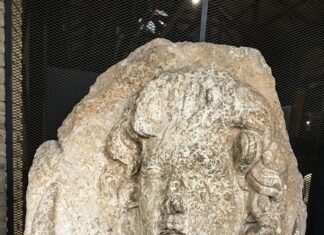29. If a man builds upon his own ground with the materials of another, he is considered the proprietor of the building, because everything built on the soil accedes to it. The owner of the materials does not, however, cease to be owner; only while the building stands he cannot claim the materials, or demand to have them exhibited, on account of the law of the Twelve Tables, providing that no one is to be compelled to take away the tignum of another which has been made part of his own building, but that he may be made, by the actio de tigno injuncto, to pay double the value; and under the term tignum all materials for building are comprehended.
The object of this provision was to prevent the necessity of buildings being pulled down. But if the building is destroyed from any cause, then the owner of the materials, if he has not already obtained the double value, may reclaim the materials, and demand to have them exhibited.
Building becomes the property
30. On the contrary, if anyone builds with his own materials on the ground of another, the building becomes the property of him to whom the ground belongs. But in this case the owner of the property, because he is presumed to have voluntarily parted with them, that is, if he knew he was building upon another’s land; and, therefore, if the building should be destroyed, he cannot, even then, reclaim the materials.
Of course, if the person who builds is in possession of the soil, and the owner of the soil claims the building, but refuses to pay the price of the materials and the wages of the workmen, the owner may be repelled by an exception of dolus malus, provided the builder was in possession bona fide. For if he knew that he was not the owner of the soil, it may be said against him that he was wrong to build on ground which he knew to be the property of another.
31. If Titius places another man’s plant in ground belonging to himself, the plant will belong to Titius; on the contrary, if Titius places his own plant in the ground of Maevius, the plant will belong then to Maevius—that is if, in either case, the plant has taken root; for before it has taken root, it remains the property of its former owner.
But from the time it has taken root, the property in it is changed; so much so, that if the tree of a neighbor presses so closely on the ground of Titius as to take root in it, we pronounce that the tree becomes the property of Titius. For reason does not permit that a tree should be considered the property of anyone else than of him in whose ground it has taken root; and, therefore, if a tree, planted near a boundary extends its roots into the lands of a neighbor, it becomes common.
Read More about The Institutes 535 CE part 19








